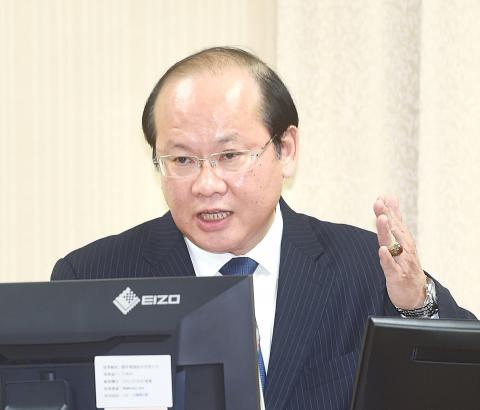Some media outlets in Taiwan are “on the same path” as China and are sources of false information, National Security Bureau Deputy Director-General Chen Wen-fan (陳文凡) said yesterday, without specifying which outlets.
Chen made the comments while presenting a report at a meeting of the Legislative Yuan’s Foreign Affairs and National Defense Committee in Taipei.
In the bureau’s report, it created a new term, “media on the same path,” going as far as to say that such media outlets exist online, in print and through wanghong (網紅, Internet celebrities), Chinese Nationalist Party (KMT) Legislator Lu Yu-ling (呂玉玲) said.

Photo: Fang Pin-chao, Taipei Times
She called on Chen to name the media outlets instead of only telling “half the story.”
“Otherwise, the National Security Bureau itself would be fake news,” Lu added.
Chen said he was not trying to sway public opinion, but was stating the truth.
Due to various considerations and the nature of intelligence work, he could not publicly name the outlets at this stage, he said, adding that he could only reveal that the problem exists.
While being questioned by Democratic Progressive Party Legislator Lo Chih-cheng (羅致政), Chen also said that the tone of the outlets was similar to that of China’s state media.
Asked by Lo whether he “dared” to release the names of the outlets, Chen said that he would do so when it becomes necessary.
Meanwhile, New Power Party Legislator Huang Kuo-chang (黃國昌) accused Want Want China Times Group (旺旺中時媒體集團) of “selling the news like advertisements” and “taking money from the Chinese government,” adding that this was something he had “exposed” while he was an academic.
To put it nicely, it would be considered “placement marketing,” and to put it harshly, it would be considered “trampling on journalistic professionalism,” he said.
While he was researching the topic as an academic, an unnamed reporter allegedly made a telephone call to discuss how they would be paid, he said, adding that there is an audio recording of the call.
Under the Act Governing Relations Between the People of the Taiwan Area and the Mainland Area (臺灣地區與大陸地區人民關係條例), if someone sells domestic news to the Chinese government, they could only be fined NT$100,000 to NT$500,000, Huang said.
What the people want to see is not that government agencies are always “researching,” but that they are taking specific action, Huang said.
He urged the Mainland Affairs Council and other agencies to state that they cannot accept “this kind of law,” referring to the act, and to push for amendments as soon as possible.
Meanwhile, National Communications Commission spokesman Wong Po-tsung (翁柏宗) yesterday denied that a draft media monopolization prevention act is meant to undercut the influence of Chinese funding on the nation’s news outlets.
The bill would require TV news channels to disclose their sources of advertising revenue, and shareholders with at least a 10 percent stake in news channels would be obligated to disclose any other businesses they have.
“The clause is designed to preserve the professionalism and independence of news media,” Wong said.
Additional reporting by Shelley Shan

MISINFORMATION: The generated content tends to adopt China’s official stance, such as ‘Taiwan is currently governed by the Chinese central government,’ the NSB said Five China-developed artificial intelligence (AI) language models exhibit cybersecurity risks and content biases, an inspection conducted by the National Security Bureau (NSB) showed. The five AI tools are: DeepSeek, Doubao (豆包), Yiyan (文心一言), Tongyi (通義千問) and Yuanbao (騰訊元寶), the bureau said, advising people to remain vigilant to protect personal data privacy and corporate business secrets. The NSB said it, in accordance with the National Intelligence Services Act (國家情報工作法), has reviewed international cybersecurity reports and intelligence, and coordinated with the Ministry of Justice Investigation Bureau and the National Police Agency’s Criminal Investigation Bureau to conduct an inspection of China-made AI language

LIMITS: While China increases military pressure on Taiwan and expands its use of cognitive warfare, it is unwilling to target tech supply chains, the report said US and Taiwan military officials have warned that the Chinese People’s Liberation Army (PLA) could implement a blockade within “a matter of hours” and need only “minimal conversion time” prior to an attack on Taiwan, a report released on Tuesday by the US Senate’s China Economic and Security Review Commission said. “While there is no indication that China is planning an imminent attack, the United States and its allies and partners can no longer assume that a Taiwan contingency is a distant possibility for which they would have ample time to prepare,” it said. The commission made the comments in its annual

‘TROUBLEMAKER’: Most countries believe that it is China — rather than Taiwan — that is undermining regional peace and stability with its coercive tactics, the president said China should restrain itself and refrain from being a troublemaker that sabotages peace and stability in the Indo-Pacific region, President William Lai (賴清德) said yesterday. Lai made the remarks after China Coast Guard vessels sailed into disputed waters off the Senkaku Islands — known as the Diaoyutai Islands (釣魚台) in Taiwan — following a remark Japanese Prime Minister Sanae Takaichi made regarding Taiwan. Takaichi during a parliamentary session on Nov. 7 said that a “Taiwan contingency” involving a Chinese naval blockade could qualify as a “survival-threatening situation” for Japan, and trigger Tokyo’s deployment of its military for defense. Asked about the escalating tensions

DISPUTE: A Chinese official prompted a formal protest from Tokyo by saying that ‘the dirty head that sticks itself out must be cut off,’ after Takaichi’s Taiwan remarks Four armed China Coast Guard vessels yesterday morning sailed through disputed waters controlled by Japan, amid a diplomatic spat following Japanese Prime Minister Sanae Takaichi’s comments on Taiwan. The four ships sailed around the Senkaku Islands — known as the Diaoyutai Islands (釣魚台) to Taiwan, and which Taiwan and China also claim — on Saturday before entering Japanese waters yesterday and left, the Japan Coast Guard said. The China Coast Guard said in a statement that it carried out a “rights enforcement patrol” through the waters and that it was a lawful operation. As of the end of last month,